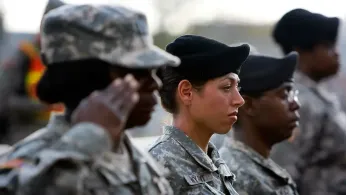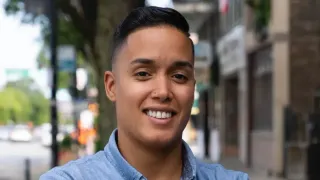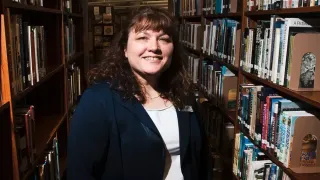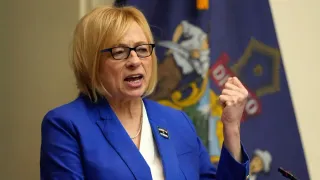
4 hours ago
ACLU Accuses Defense Secretary Pete Hegseth of Seeking to Expel Women from U.S. Military
READ TIME: 4 MIN.
The American Civil Liberties Union (ACLU) has launched a forceful public critique of Defense Secretary Pete Hegseth, accusing him of endorsing policies and rhetoric that would effectively exclude women from the United States military. The dispute centers on Hegseth’s speech to senior military leaders in Quantico, Virginia, where he asserted that the Trump administration aims to hold military servicemembers to the “highest male standard,” raising alarm among civil liberties and gender equity advocates .
Hegseth, 45, delivered his remarks as part of a wider discussion on military readiness and standards. “Each service will ensure that every requirement for every combat , for every designed combat arms position, returns to the highest male standard only,” he declared. “Because this job is life or death, standards must be met, and not just met – at every level, we should seek to exceed the standard, to push the envelope, to compete. If women can make it, excellent. If not, it is what it is,” he continued .
The ACLU responded with a sharply worded article and official statements, arguing that Hegseth’s comments and actions “betray hostility to all servicewomen” and constitute a concerted effort to undermine their rightful place in the military. “His purpose was unmistakable: smear women as unqualified while imposing physical fitness standards that he believes they cannot meet,” an ACLU spokesperson said .
The organization further highlighted Hegseth’s record since taking office, noting his dismissal of numerous senior women leaders and the elimination of the Women, Peace and Security Program, which had previously advanced gender equity and fostered the inclusion of women in military decision-making roles. The ACLU also cited the firing of Black senior officers and other leaders of color, framing these moves as part of a broader pattern of exclusion .
Gender-neutral physical requirements for combat occupational specialties were imposed in the 1990s, and recent data show that women occupy approximately 12 percent of combat-certified special operations roles in the U.S. military. The ACLU and other advocacy groups have stressed that the current training and assessment frameworks are already designed to ensure fairness among all servicemembers, regardless of gender .
Hegseth’s stance has rekindled longstanding debates about physical standards and gender equity in armed forces both in the United States and globally. In January, the Defense Secretary asserted that the military had “lowered its standards” by allowing women to serve in combat roles—a claim rebuffed by civil liberties groups and many in the defense community. At a subsequent congressional hearing, he partially recanted, stating that “women in the US military have made amazing contributions across all aspects of our battlefield” .
For LGBTQ+ advocates and allies, the ACLU’s condemnation of Hegseth is significant in the broader fight for inclusive military service. The intersection of gender, sexuality, and military policy has long been a flashpoint in U.S. political discourse, with battles over policies such as “Don’t Ask, Don’t Tell,” the transgender military ban, and access to reproductive and gender-affirming healthcare for service members .
The ACLU’s advocacy extends beyond cisgender women to include transgender women and nonbinary people, who may also face heightened scrutiny and barriers under policies that prioritize “male standards” for physical fitness and combat positions. The organization has called for the Department of Defense to uphold existing policies supporting all women, including those in combat roles, and to guarantee healthcare access—including reproductive and gender-affirming care—for all eligible service members and their families .
The fallout from Hegseth’s comments has been swift, with lawmakers, veterans’ groups, and advocacy organizations demanding clarification and accountability. Senate leaders have signaled plans to question Hegseth about his intentions regarding women’s and LGBTQ+ service members’ roles at upcoming hearings. The ACLU is urging senators to ensure that the Department of Defense adheres to constitutional checks and balances, resists any politicization of the military, and maintains support for all service members regardless of gender or sexual orientation .
Several prominent women veterans have publicly condemned the remarks, arguing that enforcing “highest male standards” could functionally bar many women from military service and roll back decades of progress. “Women have served with distinction and bravery in every theater of war,” said one retired Army colonel, “and any effort to exclude us fundamentally misunderstands the strength and diversity that makes our military great.”
As debate continues, the future of gender equity in the U.S. military remains uncertain. The ACLU and other civil rights organizations vow to pursue legal and legislative remedies should any official policy move to exclude women or undermine their rights within the armed forces.
Advocates stress that the issue is not merely about physical standards, but about the fundamental values of inclusion, fairness, and respect for all who serve. For LGBTQ+ service members and allies, the controversy is a reminder of the ongoing fight to ensure that every individual—regardless of gender identity, sexual orientation, race, or background—has the opportunity to contribute to their country’s defense without discrimination.






